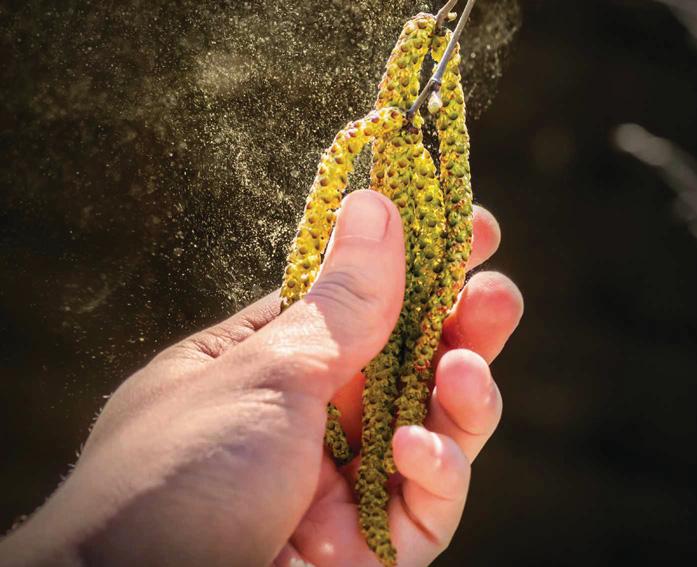कोशिश गोल्ड - मुक्त
HAY FEVER: IS IT REALLY GETTING WORSE?
BBC Science Focus
|August 2023
Hay fever sufferers say their allergies are getting worse... and climate change could be to blame

Earlier this year the Met Office warned that hay fever could get worse due to climate change. And it's not just a hypothetical problem we may face in the future. In a recent paper, researchers dug into pollen trends over the last 26 years across the UK, focussing on grass, birch and oak pollen, to investigate how changing weather patterns are already affecting hay fever season.
While the work showed that climate change is certainly having an effect, the exact changes depend on which kind of pollen you're affected by. The season for birch pollen (the second most important type when it comes to hay fever, after grass pollen), is increasing in severity - meaning the total amount of pollen seen during the season is higher.
Oak pollen season is also starting earlier and lasting longer. But there's some good news regarding grass pollen: while the first day with high grass pollen levels seems to be getting earlier, the season doesn't appear to be getting worse.
The data in the study only goes as far as 2020, but Dr Beverly Adams-Groom, lead author of the paper and senior palynologist at the University of Worcester, says those trends appear to be continuing.
"The birch pollen season this year and in 2021 were among the very worst that we've ever seen," she says.
Pollen is a fine powder made by plants as part of their reproductive cycle and hay fever is an allergic reaction to proteins found on the pollen when it gets into our eyes, nose and throat.
यह कहानी BBC Science Focus के August 2023 संस्करण से ली गई है।
हजारों चुनिंदा प्रीमियम कहानियों और 10,000 से अधिक पत्रिकाओं और समाचार पत्रों तक पहुंचने के लिए मैगज़्टर गोल्ड की सदस्यता लें।
क्या आप पहले से ही ग्राहक हैं? साइन इन करें
BBC Science Focus से और कहानियाँ

BBC Science Focus
World's biggest cobweb is home to 100,000 spiders
Spiders don't normally create such large colonies, so there's no need to worry about finding one in your basement
1 min
February 2026

BBC Science Focus
A dementia vaccine could be gamechanging – and available already
Getting vaccinated against shingles could protect you from getting dementia, or slow the progression of the disease
1 mins
February 2026

BBC Science Focus
DATA IN SPACE
An unusual spacecraft reached orbit in November 2025, one that might herald the dawn of a new era.
7 mins
February 2026

BBC Science Focus
Climate change is already shrinking your salary
No matter where you live, a new study has found warmer temperatures are picking your pocket
4 mins
February 2026

BBC Science Focus
A MENTAL HEALTH GLOW-UP
Forget fine lines. Could Botox give you an unexpected mental health tweakment?
3 mins
February 2026
BBC Science Focus
Most people with high cholesterol gene don't know they have it
Standard testing struggles to detect the condition
1 mins
February 2026

BBC Science Focus
HOW CAN I BOOST MY IQ?
If you're serious about getting smarter, it's time to ditch the brain-training apps
4 mins
February 2026

BBC Science Focus
Humans are absolutely terrible at reading dogs' emotions
Think you can tell how our furry friends are feeling? Think again
1 mins
February 2026

BBC Science Focus
HOW TO TEACH AI RIGHT FROM WRONG
If we want to get good responses from AI, we may need to see what it does when we ask it to be evil
3 mins
February 2026

BBC Science Focus
What Australia's social media ban could really mean for under-16s
Many people think social media is bad for our kids. Australia is trying to prove it
5 mins
February 2026
Translate
Change font size

